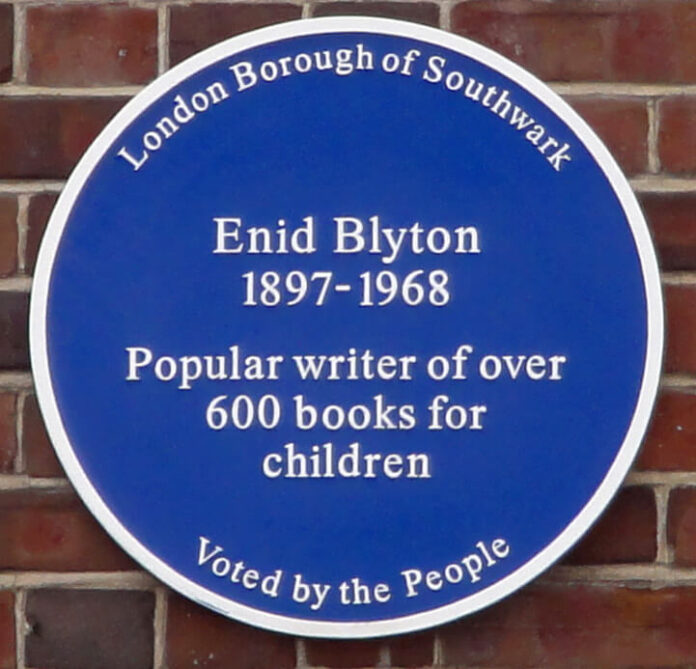
“We are the Famous Five. Julian, Dick and Anne, George and Timmy the dog …” If you grew up in the 70s and 80s, you certainly remember the song of the Famous Five series; childhood memories about exciting stories and brave children.
The author, Enid Blyton, is – not only in her home country England, but also internationally – known as one of the commercially most successful children’s writers of all times, with more than 600 million sold copies of her work that comprises more than 700 volumes. Thanks to her stories, generations of young people were (and are still today) introduced to reading.
A Coin for Great Britain’s Most Successful Female Author
Judging by the statistics, it is very likely that there are Enid Blyton fans in the committee of Britain’s Royal Mint. Therefore, a coin dedicated to Blyton was to be expected. However, what happened during a meeting in December 2016 was not to be expected. A committee actually discussed whether to dedicate a new 50-pence coin to Blyton. Yet – according to publicly accessible minutes – Blyton is known as a “racist, sexist, homophobe and not a very well-regarded writer”. The mint feared a strong reaction of the public – namely, they were afraid of what is called a “shitstorm” in the age of Facebook and the like.
Maybe the members of the committee still remembered what happened in Finland two years ago: As a reaction on the planned, rather bold coin motifs, the mint’s social media channels were flooded with criticism and irritated comments. The government stepped in and the minister in charge of the matter – who, by the way, had approved the motif beforehand – announced that the coins would not be issued with these motifs.

A Controversial Author
In fact, Enid Blyton is a rather controversial author: It is said that she had a superficial style of writing and that she made use of many stereotypes in order to describe the different characters of her books. There is truth to this. For example, the Golliwog character actually caricatured black people – and thus stood in the tradition of the minstrels, which were very popular in England back then. And yes, the good people in Blyton’s books are always part of the middle and upper class, members of marginalised groups either adapt their behaviour or they are described as “weirdly different” (if they are lucky) or simply as evil.
Are We Whitewashing the Past?
But not only Blyton’s work is the subject of such criticism. Right after the book was published, Agatha Christie changed the title of her thriller “Ten Little Niggers” to “And Then There Were None”. Astrid Lindgren, however, always refused to rewrite her books – even if Pippi’s father was a “Negro King”. Although this name has been changed to “South Sea King” in newer versions of the book in order to be politically correct, this does not change the fact that he is depicted in a way that glorifies rulers of colonial superpowers on exotic islands.
In the German version of the Famous Five, we do no longer encounter “gypsies” but “travellers”. That provokes less criticism, but the stereotypes remain. That is the crux of the matter: The censorship of words does not solve the problem.
We Shall Be Children
When I read these stories to my daughter, I see her listening with sparkling eyes – just as I did thirty years ago. Only today I am aware of the stereotypes, back then I just got lost in the exciting story. Of course, I talk to my daughter about how people used to see things differently. And my daughter understands that – and she loves the stories nevertheless. And that puts her ahead of some adults. The reason is that children do indeed distinguish between the things they read and the things they do.
And old books enable us to perceive how our values change. We have not always been eco-friendly, fair and open-minded. Do you remember the cool guys in the films, those in the style of Humphrey Bogart, with their cigarettes, smoking in the presence of children in the kitchen? And perhaps our grandchildren will judge us in the future, their foreheads creased with irritation: How could they possibly write books in which people killed each other and ate animals?

Good Work, Bad Author?
In the Independent, Harriet Hall argued against the Blyton coin because of another reason. According to Hall, we should continue to read Blyton’s work critically, but our morals should prevent us from honouring the author as a person.
Of course, we do not want to praise fascists or racists. However, the list of all impeccable human beings that are part of the history of our countries is rather short. When it comes to evaluating whether or not we should honour a politician with a coin – how many questionable decisions is he or she allowed to make? How many objectionable statements is an artist allowed to make, how many disgusting passages is an author allowed to write? Our society has to negotiate this from scratch every single time.
Despite her questionable formulations, Astrid Lindgren is featured on a Swedish 20-krona banknote since 2016. Shakespeare created in “The Merchant of Venice” the most famous Jewish character in literature stigmatised with all sorts of antisemitic stereotypes. The work was even used by Hitler as a propaganda tool – but, of course, the Royal Mint dedicated three collector coins to him.
An Advice for Mints
In its brief statement, the Royal Mint emphasised: “The point of the advisory committee is to ensure that themes commemorated on UK coins are varied, inclusive and represent the most significant events in our history. For these reasons not every event will progress to a UK coin.” This leaves us with the bitter taste that those responsible of choosing the motif were eager to avoid the discussion. Mainstream topics like flowers, sports and animals are more convenient.
It would show more courage not to decide on the motifs behind closed doors. What about public opinion surveys like those used on several other occasions? With regard to Blyton, it would also be possible to think about issuing a commemorative coin instead of a circulation coin. By doing so, one would take the critics seriously and, at the same time, steal their thunder.
And what would the author have thought of all this fuss? Blyton is said to have declared once: “Criticism of people over twelve does not interest me.” Maybe we should listen to what those younger than twelve have to say about Blyton’s work. Perhaps the Royal Mint would have made a different decision by doing so.
If you would like to be reminded of your childhood in the 70s or 80s, click here to watch and to hear the intro of the tv series The Famous Five.
In August 2019 the Daily Mail released the news that the idea of an Enid Blyton commemorative coin was blocked.
You can read Harriet Hall’s comment on the discussion in the Independent.
The Telegraph is of a completely different opinion: Blyton was not sexist, but a genius!



